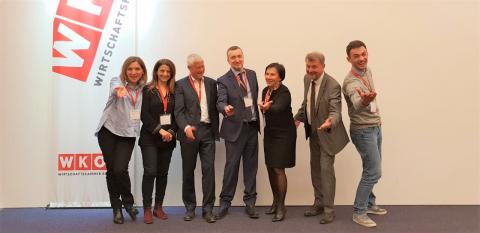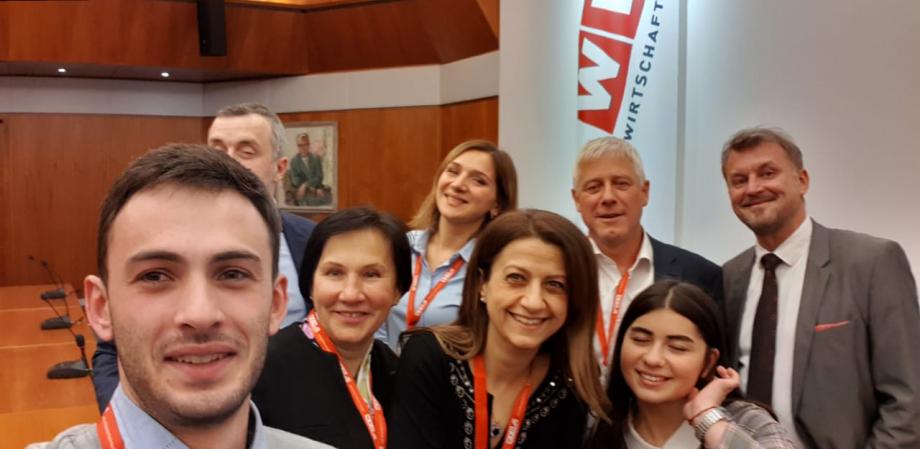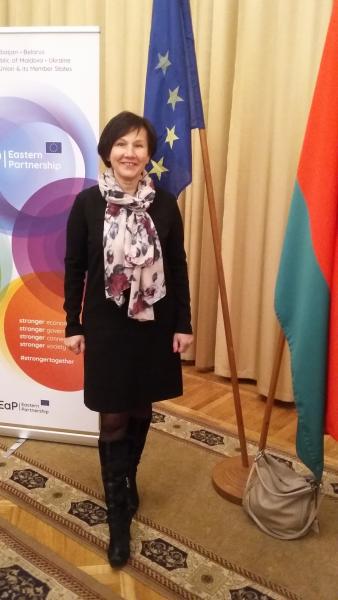As an EU-funded project comes to an end, its participants stick together to form an international Consortium.
At the end of 2018, the 5th Eastern Partnership Business Forum was held in Vienna. This annual event was a little different to the norm. In addition to the traditional panels discussing important areas of development, the annual meeting of the working group of an entirely new organisation was held at a European level. The Public Private Dialogue (PPD) Network is a consortium of business associations of the Eastern Partnership countries: Armenia, Azerbaijan, Belarus, Georgia, Moldova and Ukraine.
The members of these organisations had the idea of working together after joint participation on the East Invest 2 project funded by the European Union as part of the EU4Business initiative. This large-scale programme, which aimed at developing public-private dialogue in the Eastern Partnership countries, ended last year. More than one and a half thousand people participated in the joint activities aimed at improving communication between states and their business communities; about a hundred seminars, trainings, round tables and forums were held.
After the end of East Invest 2, several participating business associations decided to keep the established connections and expertise. Natalia Garbuz, representing the business community of Belarus, said colleagues from other countries had contacted her proposing to continue to work together.
Thus, an international consortium was formed, with several participants of East Invest 2 from Armenia, Belarus, Georgia and Moldova taking an active part (other EaP countries are also in the project, but are less active). "The consortium was born because people realised that they need it," explains Natalia, stressing that the activity is not financed by the EU, and that the associations decided to unite on a voluntary basis, as they were sorry to lose the common cooperation platform established under the EU-funded project.
The main motivation of the members of the organisation is to help the development of small and medium-sized businesses in their respective countries. And promoting this process is much better done together. "Despite the variations in development paths and relations with the EU, our countries have many common problems in the development of small and medium-sized enterprises (SMEs)," says Natalia Garbuz. "It’s very difficult for small entrepreneurs to start their own business, there’s a lack of knowledge, money and, often, initiative."
The most obvious situation in which the Consortium can be useful for SMEs is receiving information. Thanks to the cooperation of business associations from a range of countries, their members always have the opportunity to exchange successful or not so successful experience, and to obtain the necessary information about entering the markets of other countries directly from the local market players. "These are the chains that speed up the receipt of information, make it cheaper," explains Natalia Garbuz. "And in this, too, we see as a task for the Consortium."
At the present stage, the information support is available online at http://ppd-network.org/en/ and http://cee-bc.org. More than 20 bulletins are available to members of the Consortium.
On 1 February 2019, the PPD Network Consortium became a member of the Belarusian National Platform of the Eastern Partnership Civil Society Forum. The plans include active participation in one of the working groups.
Embracing change
The main goal of the PPD Network Consortium is to improve the business environment for the effective development of SMEs, including through building a dialogue between the states and their business communities. In order to achieve their plans, by 2025 the current members of the association intend to set up the largest network of associations, SME support organisations, and the scientific and expert community.
These provisions are specified in the Memorandum, which was supported by the representatives of the Eastern Partnership countries at the founding conference, held in Tallinn in October 2017.
At the current stage, the Consortium members have created associations under the Central & Eastern European Business Council (CEE BC) brand in five countries: CEE BC Armenia, CEE BC Belarus, CEE BC Belgium, CEE BC Georgia and CEE BC Moldova.
"However, the work of the Consortium will not be limited only to the territory of the Eastern Partnership states," says Natalia Garbuz. There are plans to engage six Balkan states and the same number of Asian countries. The reasons for this are logical: "We are very similar in terms of the condition of small and medium-sized entrepreneurism, we have the same growth problems, we have a common goal — to reach the group of developed countries."
"The first steps to attracting new partners have already been taken," she said. The registration of CEE BC Uzbekistan has begun, and negotiations are under way with representatives of Tajikistan.
The CEE BC network and the Consortium are planning their first large joint project in the field of tourism. The Moldovan branch of the organisation has registered the brand "Discover Gagauzia" and plans to attract travellers to this scenic area in the centre of Europe. "As tourism develops, people start coming, they get to know the country, business starts to grow, and then investments follow," explains Natalia Garbuz.
Trading with everyone
Last March, a meeting of the Consortium working group was held in Minsk during Belarusian Entrepreneurship Week, followed by a round table on business partnership and the expansion of international connections for the Belarusian businesses. It was attended by 35 representatives from seven countries.
The development of imports and exports is one of the key areas of activity for the Consortium. In addition, since last December, the Consortium has been cooperating with the Belarusian platform BYITSMART.
This is an online service used to search for business partners, buyers or sellers of goods. By registering on the BYITSMART website, platform users are able to directly receive offers and contacts, bypassing intermediaries. In essence, this is ‘uberisation’ of the process of finding partners.
The covered geography is wide. At the time of writing, there were 385 offers from 47 countries in the BYITSMART database. The total number of registered partners has reached 1,729.
Natalia Garbuz says that the platform provides not only online, but also offline services. B2B TRADECENTER, one of the divisions of BYITSMART, develops import or export solutions for specific companies.
This activity is one of the areas of cooperation with the Consortium. Natalia Garbuz says that the partners are planning to create back offices in the countries with operational CEE BC business associations. The latter will cooperate with the platform on a contractual basis, and will implement the ideas of the Consortium for the development of the export potential of SMEs. Among the services are the development of concepts for many various businesses entering a particular market, making deals for SMEs who want to overcome foreign trade barriers and at the same time minimise costs.
The basis for this is already there: business associations are ready to help each other.
Author: Katerina Shapoval
The article was prepared for the EU4Business initiative.



